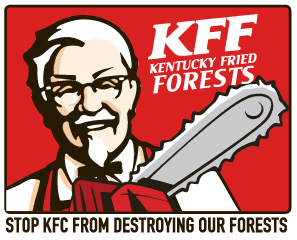Based in North Carolina, the activist Dogwood Alliance is an NGO with a regional focus and a national impact. Small in number, this group is tackling industry giant IP by targeting America's most-famous fried chicken brand.
There are literally hundreds of environmental non-governmental organizations (ENGOs) in the US and Canada that are focused on forest-related issues. Some work on a national or international level. Others, such as North Carolina-based
Dogwood Alliance have a more regional focus, but make waves on a national scale.

Founded in November 1996, Dogwood Alliance originally focused on stopping the expansion of chip mills in the Southern US. (Chip mills are the facilities that grind whole logs into wood chips that can be used for making paper pulp.) The members of the group had witnessed a decade-long proliferation of pulp mills and industrial-scale forest harvesting as paper producers moved their activities from the Pacific Northwest to the deep South.
Though it originally employed more of a “research and reason” approach to getting its points across to stakeholders, Dogwood Alliance soon adopted the “market campaign” strategy that was being used successfully by other ENGOs in their efforts to protect forests.
In October, 2000, working in partnership with
ForestEthics, Dogwood launched a campaign targeting
Staples, the largest of US retail supplier of office copy paper, demanding an end to stocking products originating in old-growth forests and US public lands and the stocking of products with at least 50% post-consumer recycled content. The campaign included letter writing, multiple demonstrations at Staples stores across the country, celebrity endorsements of the campaign, outreach to congressional and religious leaders, and awareness-raising at a Staples shareholder meeting. Two years since it began the campaign, Dogwood Alliance secured a commitment from Staples that it would phase out products originating from endangered forests (including those in the Southern US) and to aggressively increase the amount of post consumer recycled paper available for sale to consumers.
Dogwood Alliance also has been working to stop the conversion of bottomlands, swamplands, and Mid-Atlantic coastal forests to industrial forest plantations that feed the South’s packaging paper industry. It also played an active role in a failed attempt to stop the
USDA from approving
ArborGen’s application for the first-ever field trial planting of genetically engineered eucalyptus seedlings in seven southern states. (ArborGen is a joint venture of
International Paper,
MeadWestvaco, and New Zealand’s
Rubicon Ltd.)

In April of this year, Dogwood Alliance launched a new market campaign targeting
Yum Brands’
KFC fast-food chain, which purchases its packaging from International Paper. Dubbed “Kentucky Fried Forests,” the campaign claims that the fiber used to make the Kentucky Colonel’s iconic chicken buckets originates in the pristine forests of the South, including North Carolina’s Green Swamp, which the NGO claims is unique and, irreplaceable. Campaign activity to date includes a website, social media, e-letter writing, campaign events, and a host of KFC look-alike materials that can be printed by activists and distributed within KFC store environments.
If the history of market campaigns is any predictor, the Kentucky Fried Forest campaign should escalate over the next eighteen months, and will likely include nationwide public demonstrations.
 Founded in November 1996, Dogwood Alliance originally focused on stopping the expansion of chip mills in the Southern US. (Chip mills are the facilities that grind whole logs into wood chips that can be used for making paper pulp.) The members of the group had witnessed a decade-long proliferation of pulp mills and industrial-scale forest harvesting as paper producers moved their activities from the Pacific Northwest to the deep South.
Though it originally employed more of a “research and reason” approach to getting its points across to stakeholders, Dogwood Alliance soon adopted the “market campaign” strategy that was being used successfully by other ENGOs in their efforts to protect forests.
In October, 2000, working in partnership with ForestEthics, Dogwood launched a campaign targeting Staples, the largest of US retail supplier of office copy paper, demanding an end to stocking products originating in old-growth forests and US public lands and the stocking of products with at least 50% post-consumer recycled content. The campaign included letter writing, multiple demonstrations at Staples stores across the country, celebrity endorsements of the campaign, outreach to congressional and religious leaders, and awareness-raising at a Staples shareholder meeting. Two years since it began the campaign, Dogwood Alliance secured a commitment from Staples that it would phase out products originating from endangered forests (including those in the Southern US) and to aggressively increase the amount of post consumer recycled paper available for sale to consumers.
Dogwood Alliance also has been working to stop the conversion of bottomlands, swamplands, and Mid-Atlantic coastal forests to industrial forest plantations that feed the South’s packaging paper industry. It also played an active role in a failed attempt to stop the USDA from approving ArborGen’s application for the first-ever field trial planting of genetically engineered eucalyptus seedlings in seven southern states. (ArborGen is a joint venture of International Paper, MeadWestvaco, and New Zealand’s Rubicon Ltd.)
Founded in November 1996, Dogwood Alliance originally focused on stopping the expansion of chip mills in the Southern US. (Chip mills are the facilities that grind whole logs into wood chips that can be used for making paper pulp.) The members of the group had witnessed a decade-long proliferation of pulp mills and industrial-scale forest harvesting as paper producers moved their activities from the Pacific Northwest to the deep South.
Though it originally employed more of a “research and reason” approach to getting its points across to stakeholders, Dogwood Alliance soon adopted the “market campaign” strategy that was being used successfully by other ENGOs in their efforts to protect forests.
In October, 2000, working in partnership with ForestEthics, Dogwood launched a campaign targeting Staples, the largest of US retail supplier of office copy paper, demanding an end to stocking products originating in old-growth forests and US public lands and the stocking of products with at least 50% post-consumer recycled content. The campaign included letter writing, multiple demonstrations at Staples stores across the country, celebrity endorsements of the campaign, outreach to congressional and religious leaders, and awareness-raising at a Staples shareholder meeting. Two years since it began the campaign, Dogwood Alliance secured a commitment from Staples that it would phase out products originating from endangered forests (including those in the Southern US) and to aggressively increase the amount of post consumer recycled paper available for sale to consumers.
Dogwood Alliance also has been working to stop the conversion of bottomlands, swamplands, and Mid-Atlantic coastal forests to industrial forest plantations that feed the South’s packaging paper industry. It also played an active role in a failed attempt to stop the USDA from approving ArborGen’s application for the first-ever field trial planting of genetically engineered eucalyptus seedlings in seven southern states. (ArborGen is a joint venture of International Paper, MeadWestvaco, and New Zealand’s Rubicon Ltd.)
 In April of this year, Dogwood Alliance launched a new market campaign targeting Yum Brands’ KFC fast-food chain, which purchases its packaging from International Paper. Dubbed “Kentucky Fried Forests,” the campaign claims that the fiber used to make the Kentucky Colonel’s iconic chicken buckets originates in the pristine forests of the South, including North Carolina’s Green Swamp, which the NGO claims is unique and, irreplaceable. Campaign activity to date includes a website, social media, e-letter writing, campaign events, and a host of KFC look-alike materials that can be printed by activists and distributed within KFC store environments.
If the history of market campaigns is any predictor, the Kentucky Fried Forest campaign should escalate over the next eighteen months, and will likely include nationwide public demonstrations.
In April of this year, Dogwood Alliance launched a new market campaign targeting Yum Brands’ KFC fast-food chain, which purchases its packaging from International Paper. Dubbed “Kentucky Fried Forests,” the campaign claims that the fiber used to make the Kentucky Colonel’s iconic chicken buckets originates in the pristine forests of the South, including North Carolina’s Green Swamp, which the NGO claims is unique and, irreplaceable. Campaign activity to date includes a website, social media, e-letter writing, campaign events, and a host of KFC look-alike materials that can be printed by activists and distributed within KFC store environments.
If the history of market campaigns is any predictor, the Kentucky Fried Forest campaign should escalate over the next eighteen months, and will likely include nationwide public demonstrations.









